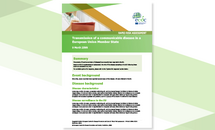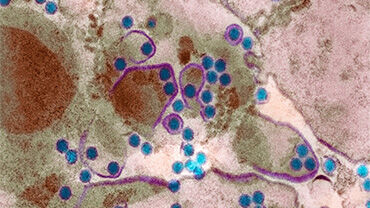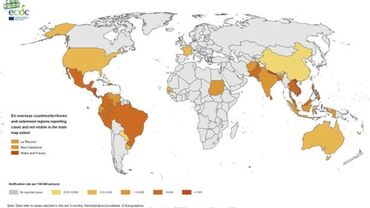Threat Assessment Brief: Dengue epidemic in Réunion, 2021
This document assesses the risk related to dengue for EU/EEA citizens travelling to or residing in Réunion, and the risk related to having an outbreak of dengue in mainland EU/EEA following introduction of the virus from Réunion.
Executive summary
Event summary
In 2019, Réunion experienced an unusually large dengue epidemic, which was followed in 2020 by an epidemic of similar magnitude. Currently, Réunion is once again facing a large dengue epidemic, which is likely to be comparable in size to that of the preceding two years. The epidemic peak is expected to be reached in the coming weeks.
Risk assessed
The risk related to dengue for EU/EEA citizens travelling to or residing in Réunion is currently high if they do not apply protective measures. The risk of a dengue outbreak in mainland EU/EEA is currently assessed as low, with environmental conditions unfavourable to vector activity and virus replication. These conditions are expected to become more favourable in coming months, with high vector abundance expected from early summer through early autumn in mainland EU/EEA.
Options for response
Most cases of dengue are acquired via the bite of an infected mosquito. However, the virus may also be transmitted via Substances of Human Origin (SoHO) and through sexual intercourse. Dengue prevention is based on protection against mosquito bites. As Aedes mosquitoes have a diurnal biting pattern, both indoors and outdoors, personal protective measures (PPM) against mosquito bites should be applied all day long. Special care should be taken during the hours of highest mosquito activity (morning and late afternoon to sunset). PPM to reduce the risk of mosquito bites include the use of mosquito repellent in accordance with the instructions indicated on the product label, wearing long-sleeved shirts and long trousers and using insecticide-treated mosquito bed nets. These measures are essential for providing protection from mosquito bites in rooms that are not adequately screened or air-conditioned.
Travellers returning from areas where dengue virus circulation occurs should be advised to seek medical attention if presenting with symptoms compatible with dengue in the first two weeks after return, particularly if returning to areas where the Ae. albopictus mosquito is established and during the high vector activity period. Symptomatic patients should be advised on how to apply PPM against mosquito bites in order to prevent transmission of the virus to local mosquitoes in mainland EU/EEA.
Download






